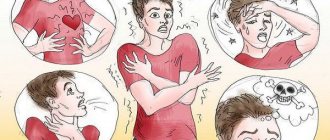Many people experienced a condition that they could not really explain.
According to them, they felt the unreality of what was happening, the reality around them became two-dimensional, as if drawn. The perception of sounds was also distorted. This disorder is called derealization. Attacks can be prolonged or short-lived, and the frequency of their occurrence can also vary. Derealization is sometimes called depersonalization, but these are two different pathological conditions. In the first case, a person suffers from a psychosensory perception of the world, and in the second, an internal personality disorder is observed. Simply put, depersonalization refers to processes occurring within a person, while derealization is formed as a result of the loss of the ability to sense external stimuli. But derealization and depersonalization very often accompany each other, so even in the International Classification of Diseases these disorders are combined into one syndrome.
How does derealization manifest itself?
There is a persistent feeling of the unreality of what is happening, that everything familiar and ordinary has become unnatural, alien. Fantastic changes are palpable, but none of the patients can explain how such a transformation occurred. And they also fail to clearly formulate what changes have occurred. Statements on this matter lack specificity. When describing their feelings and experiences, people use the words “as if,” “most likely,” “possibly.” It seems that patients are making guesses rather than stating anything definite.
A person sees reality as if in a dream or through a cloudy glass. When the symptoms are severe, he loses his sense of reality. For example, a patient in this condition will not say what he ate for breakfast. It is difficult for him to remember his usual route from home to work, and it is easy for him to get lost on a well-known street or in a public building. The patient may lose track of time. There are cases when the feeling of unreality turns into an aggravated state and people even cease to feel their existence in the world.
Symptoms of derealization:
- The surrounding world is perceived “through the fog” or as a dream;
- Orientation in time and space is disturbed. Sensations, sounds, and sizes of surrounding objects are distorted;
- Trust in current events disappears;
- There is a fear of going crazy. Constantly haunted by a feeling of “déjà vu”;
- The sense of reality completely disappears (severe course of the syndrome).
A similar condition can be observed even in mentally healthy people who experience severe overwork, systematic lack of sleep and constant stress. The psychotic nature of this syndrome is often combined with depression, various neuroses and is accompanied by panic attacks.
How to get to the clinic for examination and treatment
If you don’t know how to deal with derealization symptoms, contact our medical center. Hotline number 8(969)060-93-93 . It operates 24 hours a day on weekdays, holidays and weekends. Consultants answer calls free of charge and anonymously. From them you can find out all your questions, make an appointment with a doctor at the clinic or make a house call.
The medical center website has additional options:
- Order a call back.
- Online consultation.
- Registration of initial consultation.
The specialists on duty will help you find out the exact prices for diagnostic and therapeutic procedures of interest, and will give advice on derealization.
Causes of derealization and depersonalization
In modern society, people are subject to negative influences. Interpersonal conflicts and increased emotional and physical stress occur. It is necessary to withstand the busy rhythm of life. Depersonalization may occur with VSD.
The cause of the syndrome is most often associated with deprivation. Suppression, over a long period of time, of a large number of conscious and unconscious needs and desires, awareness of one’s real capabilities, which are not enough to achieve one’s goals, unsuccessful attempts to achieve success in one or another area of life.
Click to enlarge
Subsequently, the perception of the surrounding world or oneself may be disrupted. Thus, the body turns on a protective mechanism, where derealization acts as a pain reliever, reducing the consequences of emotional shock. For this reason, the largest category of patients includes people who do not recognize the possibility of error, avoid ambiguity and uncertainty, and strive to achieve perfection in everything.
We recommend reading: Burning sensation in the chest with VSD
This is a common reaction of a mentally healthy person. It helps maintain reasonable behavior during emotional turmoil. In times of danger, it is important to step back from what is happening in order to maintain the ability to act effectively. But for a person with VSD and derealization, even a banal everyday situation can cause anxiety and stress. At the same time, he begins to analyze his condition, looking for any deviations, as well as the reasons that caused them. A negative assessment of what is happening further aggravates the situation and leads to a depressive state.
Derealization in VSD is not a mental illness or psychosis. There are no hallucinations, the person understands that his condition is abnormal, unlike a madman who can rarely realize this. Sometimes, a patient with VSD even claims that he has gone crazy or defines his condition as borderline.
Thus, several main causes of this syndrome can be identified:
- Extreme stress;
- Depression;
- Traumatic situation;
- Use of psychotropic drugs.
Most often, the syndrome develops under the influence of prolonged, severe stress. Exhaustion of the nervous system causes a decrease in sensitivity as a protective mechanism. Then the individual unconsciously creates a distorted perception of reality.
Factors that provoke the development of derealization may be psychophysiological in nature. These include:
- Learning problems;
- Difficulties in professional activities;
- Difficult relationships with other people;
- Bad ecology;
- Lack of minimal comfort, for example, constant travel in crowded transport, poor living conditions.
The causes of derealization include somatic disorders:
- Osteochondrosis, especially of the cervical region;
- Muscle hypertonicity;
- Some mental disorders;
- Vegetovascular dystonia.
Among the causes of the syndrome, drug addiction and alcoholism can be particularly noted. A state of intoxication caused by drugs or alcohol can turn into derealization. Overdoses of certain drugs cause a feeling of fantastic or distorted space, an incorrect perception of oneself, which is accompanied by numbness of the limbs, the appearance of peculiar visual images, etc. Alcoholic delirium (delirium tremens) is almost always complicated by derealization syndrome and hallucinations.
So, we can identify several main risk factors that contribute to the development of derealization:
- Characteristics that make it difficult for a person to adapt to difficult circumstances;
- Hormonal changes, especially during puberty;
- Drug use;
- Psychical deviations;
- Some somatic disorders.
We recommend reading: A complex of therapeutic exercises at home.
Any manifestations of this syndrome cannot be ignored. Regardless of the degree of its development, you need to seek help from a specialist. The sooner this is done, the less time the treatment will take.
I'm crazy?
It’s hard for a VSDer to believe that with such a feeling of unreality in his head, he is still not among the ranks of the crazy. The world has ceased to be familiar, even the soul is lost, isn’t this schizophrenia? There are three important features that distinguish the “dereal” in VSD from the “dereal” of a mental patient:
- The VSD worker is still afraid of madness and “tests” himself for it: this means that he is able to assess what is happening.
- With VSD “dereal” there are no hallucinations, either visual or auditory. The world is distorted, but there are no new objects or new voices in it.
- Dystonics do not have any mania, they do not consider themselves to be the embodiment of other beings and do not perform mentally automated actions.
Distortion of reality during VSD is not the beginning of madness.
This is just our psyche’s response to an overdose of stress and phobias. “Dereal” does not manifest itself in every person with VSD and does not directly depend on the amount of stress (each person has his own threshold of mental stability). But, having once experienced a similar condition, the patient begins to wait for it again. In the same way, people with VSDs anticipate with horror the approach of a new panic attack or attack of tachycardia. Anticipation of a frightening state provokes its appearance. It is difficult to get out of such a vicious circle on your own. The help of a psychotherapist is needed.
Treatment of derealization
Click to enlarge
The treatment of derealization is carried out not by psychiatrists, but by psychologists and psychotherapists, since it is not a disease, but a pathological condition. Prescription of antidepressants, antipsychotics and tranquilizers is common. Sometimes doctors prescribe nootropics. It is believed that anti-anxiety medications may reduce some of the symptoms of this syndrome.
It is possible to select the necessary treatment only by taking into account the psychological characteristics of a person and his general condition. Modern methods of psychotherapy are aimed at eliminating all symptoms using various modeling psychological methods, psychotherapeutic recovery methods, and hypnosis techniques. Synchronization and sensory modeling, color treatment and cognitive therapy are also successfully used.
Positive results can be obtained by improving the patient’s usual living conditions, normalizing the daily routine, changing jobs, and practicing various types of recreation.
In the future, to prevent relapse of the abnormal condition, preventive measures will be of great importance. You should periodically change your usual conditions and environment, try to fill your life with new impressions, and focus only on the positive aspects of what is happening.
Individual therapy is prescribed by a doctor after solving the following problems:
- Identification of factors that caused the syndrome.
- Analysis of the patient’s condition taking into account individual symptoms.
- Conducting testing.
Experience has shown that derealization is difficult to treat with medications and often aggravates the problem rather than solving it. The reason that caused the mental disorder cannot be eliminated only with the help of medications, since many psychological aspects are not taken into account during drug treatment. There is often resistance to the treatment of this disease with pharmacological agents in NCD. Getting rid of symptoms in itself does not make any sense. Only by influencing the causative factor can this problem be completely solved. By following these recommendations, you can change the situation for the better:
- Quitting alcohol;
- Systematic physical education and sports. Fitness and yoga are very suitable;
- Recreation, including active recreation;
- Auto-trainings;
- Normal sleep;
- Taking vitamin complexes, especially those containing calcium and magnesium;
- Psychotherapy;
- Meditation;
- Water treatments, various relaxation methods.
The best cure for derealization and VSD are positive emotions. Getting them when the nervous system fails is not an easy task. But it is possible to influence the attack itself and try to reduce its intensity using the following recommendations:
- Try to relax, normalize your breathing;
- Remember that the distortion of reality is only a temporary, passing reaction that has nothing to do with madness;
- Try to focus attention on one subject, but do not try to consider the nuances, as this can lead to additional stress;
- Focus on a specific thought about everyday things. Therefore, it is important to find the cause of the disorder during a psychotherapy session.
We recommend reading: Is it possible to play sports with VSD?
In similar ways, it is indeed possible to cope with attacks. However, the state of derealization that autonomic dysfunction causes will still have a negative impact on the psyche and, thus, reduce the quality of life.
Treatment
Since conditions such as derealization and depersonalization are not independent diseases, treatment will be aimed at eliminating the underlying disease. This problem requires an integrated approach, which can be implemented by doctors of various specializations, but psychotherapists and psychiatrists play the leading role in correcting the disorder.
Therapy should be carried out in several directions:
- Medicines are actively used in the treatment of derealization and depersonalization. Recommended medications include tranquilizers, antipsychotics and antidepressants. These drugs can reduce the manifestations of anxiety and eliminate depression, against the background of which pathology can develop. In addition, other medications may be recommended. Prescriptions depend on the type of the patient’s underlying disease, his individual characteristics and the severity of the pathology.
- Among psychotherapeutic methods, the most effective are cognitive-behavioral techniques. Good results can be achieved by combining the methods of self-hypnosis, art therapy, music therapy, etc. Auxiliary techniques can improve the patient’s psycho-emotional state.
- Rehabilitation helps to avoid the re-development of derealization. This becomes possible thanks to the normalization of sleep, work and rest patterns, as well as the elimination of stress factors that can provoke a relapse of the disease.
To prevent the need for treatment of derealization from arising at all, you need to pay special attention to strengthening the psyche and nervous system. After all, events leading to the development of stress can happen at any time to any of us. Exercising, walking in the fresh air, eating a healthy diet and maintaining a sleep schedule - all this will help a person cope with negative factors and maintain mental health.
The role of psychotherapy in the fight against derealization
Psychologists and psychotherapists can eliminate pathological mental attitudes that they can detect in an individual. The disorder may be associated with childhood trauma, severe emotions, or as a result of the loss of a loved one. The disorder can be caused by stressful situations at work, unfulfilled hopes, troubles in your personal life and other factors. Without working through the causes, it is impossible to talk about an exact favorable prognosis for treatment. In most cases, the use of cognitive behavioral therapy, Ericksonian hypnosis and other methods of psychotherapy can help.
Success in recovery is also determined by the participation of the patient himself. It is necessary to constantly monitor yourself in various circumstances, under various emotional stress. For progress in treatment, a person’s attitude towards derealization is important, whether he considers it terrible, incurable, or is determined to get rid of it quickly. A strong will and a firm desire to get rid of the disease are required.
A high quality of life is impossible without the presence of harmony and positive emotions in it. It is not necessary to cope with difficulties and bring joy with the help of antidepressants and tranquilizers. In life itself you can find a lot of reasons to smile and cheer yourself up.
Every person has sufficient resources to survive failures, continue to act, and be optimistic. The psychotherapist points out the peculiarities of the patient’s psyche, helps him apply healing practices that can protect his health and defeat derealization forever.
Also read with this article: Panic - causes, signs, symptoms, types, forms, treatment Table: 200+ drugs prescribed for the treatment of symptoms of VSD Treatment methods for vegetative-vascular dystonia 1 Consultations with specialists Entire section Depersonalization Entire section
An abnormal perception of the surrounding world and oneself, when everything seems unreal, and one’s own thoughts, emotions, sensations seem to be observed from the outside, is called depersonalization in psychiatry. Often it occurs along with derealization, characterized by the remoteness of everything around, the absence of colors in it, and memory impairment. Due to the similarity of symptoms, in the 10th revision of the International Classification of Diseases, depersonalization-derealization syndrome is designated by one code F 48.1.
Perception disorder affects more than 70% of people worldwide from time to time. It seems to them that their consciousness is divided into two parts and one of them, having lost control over their mind and body, panics, and the second indifferently watches this from the side. It's like a bad dream and therefore very frightening. A person sees everything in a fog, in muted colors, and cannot move either an arm or a leg. He feels extreme discomfort and feels like he is going crazy.
Experts do not consider this disorder a serious mental pathology. The human psyche can react this way to stress, fear, severe emotional shock, and even overwork in the physical sense. The brain “turns on” the defense, reducing a person’s sensory sensitivity and emotionality, so objects seem strange, unusual to the touch, and colors appear faded. That is, the perception of the world becomes unusual and strange, unfamiliar. This condition usually goes away on its own and quickly, without treatment.
But, if such a syndrome manifests itself frequently and lasts for a long time, and the symptoms intensify, then it is already dangerous: the individual can harm himself and others with his inappropriate behavior, or commit suicide. Therefore, in this case, the help of doctors is necessary.
You need to know that depersonalization can also accompany clinical depression, panic attacks, anxiety and bipolar disorders, and schizophrenia. Similar sensations are caused by narcotic drugs, sedatives and antihistamines and a number of other medications, as well as caffeine and alcohol.
Causes
Derealization disorders develop as a result of a combination of psychopathological mechanisms affecting a person from the outside and painful processes in the central nervous system.
Doctors identify the following causative factors:
- Acute and chronic stress reactions of the body to external and internal stimuli.
- An attempt to achieve goals that are inaccessible to a specific person. The growing conflict between desire and the gradual understanding of its impossibility leads to a distortion of the perception of the world.
- Psychotraumatic events: experienced violence, especially in childhood, sudden disability, loss of a loved one.
- Taking psychoactive substances.
- Mental illnesses: schizophrenia, bipolar disorder.
Most often, derealization syndrome manifests itself in emotional individuals who are prone to anxiety and take everything to heart. We are talking about both character accentuation and borderline neuroses.
Causes of perception disorder
Depersonalization occurs in people of different ages and genders, but most often it affects young women. As already mentioned, it is caused by a stressful situation. The psyche that resists it reduces the strong emotional load of a person, switching his attention to outside observation. Thus, the individual turns his consciousness inward, his senses become dulled, but logical thinking remains the same.
The process of development of the syndrome in the body looks like this: under the influence of stress, a large amount of endorphins begins to be produced. As a result of their large-scale chaotic attack on receptors, the limbic system responsible for emotions is unable to cope with such pressure and is forced to partially shut down.
But the above mechanism can also be triggered by other physical factors:
- stroke;
- hypertension;
- brain tumor;
- neurological disease;
- head injury;
- epileptic seizure;
- neurosurgical operation;
- severe infectious disease in childhood;
- birth injury.
Very rarely, depersonalization is inherited or is a consequence of negative changes in the nervous system.
It has already been said that taking drugs or other intoxication of the body can also cause a disorder of perception, as this provokes increased production of “hormones of happiness” - endorphins. Therefore, in the United States, an organization on drug addiction issues is studying depersonalization at the state level.
It should be noted that in schizophrenia, split personality has other causes and this is a symptom of a serious mental disorder, the approach to which is special and requires complex treatment.
Symptoms
There are 3 conditional groups of signs characterizing depersonalization syndrome:
1. Emotional coldness, indifference in the perception of the surrounding world, detachment, indifference to people::
- indifference to the suffering of others;
- lack of joy when communicating with family and friends;
- insensitivity to music;
- loss of sense of humor;
- maintaining equanimity in situations that previously aroused any feelings, both negative and positive.
Fear is experienced only from the loss of control of one's body and loss of orientation in space. The feeling of confusion from not understanding the location, the history of getting here and further actions is depressing.
2. Violation of physical sensations:
- Loss of sensitivity to hot and cold;
- colors become dull, color blindness may appear;
- taste sensations change;
- objects seem blurry and have no boundaries;
- sounds seem muffled, as in water;
- There is no pain with minor wounds;
- coordination of movements is impaired;
- There is no feeling of hunger, and with it the appetite disappears.
3. Mental immunity:
- a person forgets his preferences - what he likes and dislikes;
- lack of incentives and motives - reluctance to take care of yourself, cook food, do laundry, work, go shopping;
- temporary disorientation - an individual can sit without doing anything for several hours and not understand how much time has passed;
- the feeling of participating as an actor in a boring, drawn-out play;
- contemplation from the outside of your life, as if it were a dream.
The main sign of a perception disorder is a person’s deep self-absorption. At first he realizes that he perceives his personality incorrectly, this depresses him and causes strong emotional disturbance.
When trying to understand what is happening, the feeling of unreality becomes stronger, and the absurdity of the situation forces the individual to avoid communication with other people. The individual, however, is aware of the painfulness of his condition.
In general, the clinical picture of depersonalization can be described as follows:
- The perception of the world is disrupted - it seems unreal, fantastic.
- Complete detachment from what is happening around.
- Loss of satisfaction from natural physiological needs - sleep, food, defects, sex, etc.
- Closedness.
- Impaired perception of the structure of one's body - arms and legs seem artificial, of unknown configuration or size.
- Inability to control your body.
- Decreased intellectual abilities.
- Feeling of loneliness, abandoned by everyone.
- Absence of any emotional manifestations.
- Changes in physiological sensations.
- Split personality.
- The feeling of watching yourself from the outside.
These symptoms of perceptual disorder may have varying degrees of severity for different types of depersonalization, which will be discussed below.
Chapter 7. Feeling detached from the world around you
First of all, let me clear up one question that I get asked a lot. “I feel more and more detached from the world around me, am I going crazy?” My answer: “No, you are not going crazy.” This feeling arises from constant worry about your problems. You are so accustomed to observing yourself day after day, asking questions about your illness, that you begin to feel detached from the outside world. Maybe when you're talking to someone you feel like you're in a different place. You hear everything, but what you are told does not reach you. Your thoughts are directed more inward than outward, which forces you to focus attention on yourself while at the same time trying not to lose the thread of the conversation.
I had to convince myself of this for a long time when I was experiencing a feeling of anxiety, and I was the last to get rid of the feeling of strangeness. I felt so disconnected that I could not read books or carry on a conversation. I felt like I was playing a role in a movie and going through the day that way. I simply lost touch with other people and with everything that was outside my little world. Now I realize that I just got into the habit of watching myself all day long and was so caught up in how I was feeling and how I could get better that I lost interest in the outside world and didn’t let anything into my world. I was completely consumed by my anxiety. When I talked to people, I constantly thought about my state, and it was difficult for me to listen or concentrate on what my interlocutor was saying.
It's no wonder we can't follow the gist of a conversation when we're so preoccupied with how we're feeling. We are drawn inside ourselves, our brains become tired due to endless thoughts about our condition. Everything seems gray and blurry, our brains become less resilient and we find it difficult to concentrate. The more we focus on our sensations, the more our brain becomes closed in on itself, gets tired and loses stamina.
A person suffering from these sensations may spend months or even years studying themselves and their condition. No wonder his brain becomes exhausted, unresponsive and so tired. In such a situation, it would not be easy for a person with a healthy brain, but we stubbornly continue to exhaust our already tired brain even more day after day. Your brain can become tired from overuse, as can your arms and legs. Sometimes you feel so tired and overwhelmed that you have to drag your exhausted body around with you. Your body is as tired as your brain. If we experience physical fatigue, we give rest to our arms and legs. Imagine how tired they would be if we kept pushing them. They would probably be as exhausted as our brains.
It is enough to go to one of the Internet forums devoted to this topic and find numerous posts on it of people worried about their symptoms. The following questions are usually asked:
I'm going crazy?
Maybe it's more than just anxiety?
When will this all end?
Why am I getting worse and not better?
It pains me to see how these people suffer in search of answers about the causes of their condition and cannot find them. This, in turn, intensifies their experiences; they plunge further into the abyss of daily experiences, further bombarding their already tired brain. I will give you one valuable piece of advice: DON’T WASTE TIME UNDERSTANDING YOUR CONDITION. This will give your brain a break and make it much more flexible.
Similar advice helped me break this habit. I realized that there was no point in trying to find answers all day and asking questions about every sensation. This is what I have to constantly convince other people of, because they are sure that there must be something else. They are convinced that their situation has an instant solution. But remember: a healthy brain couldn't feel the way you feel in an instant, so your tired brain can't recover in an instant either. Your condition did not suddenly become like this. It may have taken months or even years for your brain to become dull and unresponsive, so don't expect it to suddenly become receptive and clear again. I remember a phrase I heard from a person who had fully recovered: “It wasn’t like I woke up one morning and felt completely healthy. It was a gradual transition." This is exactly the point - who you were before begins to emerge gradually. Therefore, do not despair, over time your brain can and will definitely become clear again, as it once was, provided that you do not disturb it and give it a break from all worries and introspection.
I told myself everything that you probably tell yourself: “Nothing will work out. I know myself only as I am now.” Yes, and at some point you probably couldn’t imagine that you would feel the way you do now. Let me tell you straight - if you accept this feeling of alienation for two weeks, it will disappear! Do not under any circumstances limit the period during which normal sensations should return to you. It took me several months to fully return to normal and regain the clear thoughts that allowed me to think and live as before.
Many people experience this feeling of alienation for several months, after which they find effective advice and get out of this state quite easily, because the habit has not yet taken root. This is what happens when you lose someone you love and you withdraw into yourself for weeks due to grief. Time heals, and after some time you again quite easily restore contact with the outside world and your surroundings. The reasons are the same. A person is absorbed in grief and his own feelings, he has little time left for the outside world and what is happening around him, hence the feelings of confusion and detachment. This applies to the majority of those who experience a feeling of anxiety - they are not consumed by grief, but by worries and fixation on their sensations, which lead to a feeling of alienation from the world around them.
For the time being, you must accept these feelings of alienation. Give in to these feelings and don't worry about them. Live with them, no matter how strange and tiresome they may be. Don't fight the feeling of detachment by trying to return to normal or hide it. The less we think about our condition, the more attention we pay to other things. This is a way to get your life back to normal, which is impossible while you worry and obsess over your condition all day long. Pay less attention to your feelings and do other things. I don't mean try not to think about it, because out of habit your thoughts will return to your state, just don't worry, don't obsess about it and don't try to "fix" this feeling of being self-absorbed and alienated from the outside world. Just live a normal life.
By doing this, you will stop focusing on yourself, and your condition will begin to improve. It may only be for a few moments at first, but gradually you will feel better over a longer period of time.
Through my experience, I began to understand the reason for feeling alienated from other people. I believed what they told me and stopped worrying about my feelings. I have found myself in difficult situations where I had to interact with people I knew and did not know, expecting to feel strange and alienated. My motto was: “If I feel weird, it’s okay.” I stopped worrying about it and trying to analyze my feelings. I continued to feel alienated, but I learned not to worry about it. The feeling won't go away, so it's best to accept it. And thanks to the fact that I stopped listening to myself anxiously, I found that I could better follow the flow of the conversation. Over time, I began to take more interest in what was being discussed rather than in my condition. I have restored contact with the outside world. Do you understand how this happened? My habit of observing myself in such situations began to fade away, the habit of worrying about my feelings was replaced by the habit of not worrying about them. This has become my new habit
. If you find yourself in a similar situation, accept the feeling of alienation and don't question it. This is a temporary and minor sensation. Even if you haven't experienced it for a while and it comes up again, don't worry. It may arise from memories, but just accept it and after a while your rested brain will become clearer and more receptive. Do not try to forcefully return normal sensations. You have to wait until they come back on their own, which will happen.
Introspection
Introspection is very similar to feeling alienated from what is happening around you, because it is introspection that creates the feeling of alienation. I think it’s better to separate these two concepts and focus more on self-analysis, since this was one of the symptoms that turned out to be the most difficult to get rid of.
Introspection is the feeling that we can only think about ourselves and no one else. We are so preoccupied with our condition and absorbed in ourselves that it is difficult for us to communicate with other people. It seems to us that our sensations surround us and it is difficult for us to concentrate on anything else. Even something as simple as reading a newspaper can be difficult because our thoughts keep returning to our state. This condition can last months, and sometimes years, during which we worry about our well-being, delve inside ourselves, monitor our symptoms and spend hours trying to find ways to improve our condition. I mastered all this perfectly over the years, constantly searching in my head for a magic remedy or phrase that would stop this nightmare. In those days there was no Internet to search for information. The doctors couldn’t help me, they just bullied me and prescribed new useless pills.
I was so lonely and leading a double life. In one life, I tried to find a way out of this nightmare, I lived every day as an ethereal shell, not feeling the slightest interest in what was happening around me. In another life, I tried to get through the day and still appear normal, smile when I needed to, and carry on conversations when all I wanted was to run away and hide somewhere. It really was not life, but a living hell into which I plunged deeper and deeper. The more I thought and worried about my condition, the more disconnected from reality I felt, so I thought and worried even more. It was a terrible vicious circle. I even remember one day on the way to work, I was so lost in myself and so disconnected from my surroundings that I had to count cars to try to reconnect with the outside world. I was completely broken by my condition.
Many, like me, may feel that this habit is firmly ingrained and difficult to break. I thought this way for many years due to a lack of understanding of the essence of the problem, but over time I managed to fall in love with the world around me again and become a part of it, no longer worrying about my feelings. Any of you can change your habits. The habit of worrying about your well-being became the reason for the appearance of these sensations. In order to change it, you need to learn not to pay attention to your condition.
As a summary of this chapter, feelings of disconnection from the world around you arise from ruminating about your well-being, preoccupied introspection, and a lack of fulfilling life. Often life turns into self-contemplation and worry about your condition, trying to find a way out of it, and that is why you begin to feel deep within yourself and detached from the outside world. By learning not to constantly monitor your condition and not think every day about how you feel, you will become more involved in the world around you and feel harmony with it.
Varieties
Modern psychology shares several forms of depersonalization syndrome, differing in the uniqueness of their perception of the world around them and themselves:
- Autopsychic depersonalization is a heightened sense of one’s “I”, an increase in the feeling of its loss. It seems to a person that some stranger lives in him, feels at ease and acts in his own way. Such a split makes you suffer and experience discomfort, and reject yourself. Social contacts are difficult.
- Allopsychic depersonalization – derealization. The surroundings are perceived as a dream, the world is seen as through a cloudy glass. Everything seems alien and hostile: sounds are booming, objects are fuzzy, people look the same. Automatic thoughts and movements, disorientation, deja vu.
- Anesthetic depersonalization - increased internal vulnerability with complete external insensitivity.
- Somatopsychic depersonalization, characterized by a pathological perception of one’s body and its functions. It is the most unusual: it seems to a person that he has no hair or clothes, parts of the body have changed and live their own separate lives. Eating is difficult - the throat “does not want” to push food through, there is no desire to eat. Taste sensations change, sensitivity to air and water temperature decreases.
Diagnostics
To identify a perceptual disorder, a thorough interview of the patient and his relatives is required - they will describe the patient’s behavior. Special testing is also carried out.
Blood tests and examination of the patient will not yield anything - he does not look sick, he has no chronic or hidden somatic diseases, his immunity is not satisfactory, and his physical condition is quite normal. But an MRI will show changes in certain areas of the brain. There are also special laboratory studies confirming changes in protein receptors and disturbances in the functioning of the endocrine gland - the pituitary gland.
Now there are clear criteria to confirm the diagnosis:
- Critical thinking of a patient who is aware of his problem.
- Maintaining clarity of consciousness, the absence of so-called twilight episodes, confusion of thought.
- Complaints that the mind exists separately from the body, the latter exists independently and its perception is impaired.
- A feeling of changing terrain, unreality, misrecognition of familiar objects.
The specialist should distinguish depersonalization from schizophrenia, which has similar symptoms. These pathologies are distinguished as follows: schizophrenia manifests itself with the same symptoms of the same intensity every day, and with a perceptual disorder they are much more varied.
Therapy for depersonalization disorder
Since this disorder is individual for each patient, treatment is selected for each patient separately.
As already mentioned, short-term cases of depersonalization do not require treatment, but psychoanalysis will help eliminate the discomfort.
If the culprit of depersonalization is the use of narcotic substances, then detoxification of the body is carried out. Hormonal treatment will be needed if the cause of the disorder is endocrine pathology.
Depersonalization due to depression, panic attacks, schizophrenia, the psychiatrist prescribes a complex of tranquilizers, antidepressants, and antipsychotics. The following drugs are indicated:
- "Decortin";
- Seroquel in combination with Anafranil;
- "Cytoflamin";
- "Cavinton";
- "Naloxone";
- vitamin C with drugs such as Amitriptyline, Sonapax, Clopiramine, Quetiapine.
Some patients have to take psychotropic medications for life, since the syndrome cannot be completely cured. Medicines allow them to relieve the severity of the feelings caused by the disorder.
When symptomatic manifestations subside, it is time for psychotherapy. The specialist conducts a series of sessions with the patient, during which he identifies the causes of the perception disorder, switches the patient’s attention to other people, and teaches him to subsequently cope with emerging attacks of duality.
An effective method for getting rid of depersonalization is to remember strange feelings and then tell them to a psychologist. The latter, in turn, teaches the patient not to be afraid of such cases, and they gradually fade away.
Auto-training and hypnosis are also successfully used; they are most effective together with explanatory therapy.
Additional measures may be prescribed:
- acupuncture;
- soothing massage;
- phytotherapy;
- taking antidepressants;
- physiotherapy;
- homeopathy.
Psychotherapeutic techniques are supported by social rehabilitation: the patient is advised to be in public more often, go to museums, theaters, etc. This gives tangible results in treatment and recovery.
It happens that people with a severe degree of depersonalization have a negative attitude towards the rehabilitation program and are passive. In this case, they resort to the help of the patient’s relatives, who literally drag the relative “out into the world.”
Sources used:
- https://vsdpanika.ru/vsd/derealizatsiya.html
- https://arbat25.ru/myi-lechim/psixicheskie-rasstrojstva/depersonalizacziya











